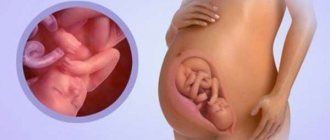Other causes of intestinal upset
The worst thing is when diarrhea at 37 weeks is not related to the birth process, but is caused by other factors.
Most drugs are not recommended for use by a pregnant woman, especially at this stage. This can complicate treatment and worsen the woman’s well-being. It is important to pay attention to the following possible causes of intestinal upset shortly before childbirth:
- penetration of intestinal infection;
- food poisoning;
- parasitic disease;
- individual reaction to drugs or certain foods.
To understand what to do in each specific case and what help to provide, it is worth taking a closer look at each cause of the problem.
Diarrhea due to infections
This is the most dangerous cause of diarrhea during pregnancy, especially in the later stages. Some infections cause severe weakness, intoxication and dehydration. Treatment is impossible with the help of improvised means. Drug therapy required
It is important that medications are prescribed by a qualified physician
Diarrhea can be caused by dysentery, rotavirus, influenza or salmonellosis. In addition to intestinal upset, a woman will complain of:
- headache;
- nausea and vomiting;
- high temperature;
- pain;
- weakness.
To preserve the health of the unborn child and woman, emergency medical care is required.
Diarrhea due to poisoning
This condition also does not bring anything good, but the risks are lower than with infectious diseases. The cause of diarrhea can be missing food or dishes that were stored incorrectly. Symptoms in addition to those described above include:
- muscle aches;
- chills;
- loss of appetite;
- aversion to certain foods.
A woman is not immune from poisoning at any stage of pregnancy. She must carefully monitor her diet and carefully check the expiration dates of the products she consumes.
For food poisoning, treatment usually involves reducing intoxication with gentle medications approved for use by pregnant women
It is important to drink enough water as the risk of dehydration is high. They also use rehydration solutions
Parasites in the body
Only a doctor decides whether or not to treat parasites during pregnancy after conducting a detailed examination. In some cases, a decision is made to simply support the woman and carry out treatment after childbirth. In this regard, a rash may appear on the body, increased weakness may be felt, and food preferences may change.
Rarely does a parasitic infection occur without pain. Typically, women are bothered by spasms in the navel and rumbling in the intestines.
Individual characteristics
Every woman's body is unique. Some eat all foods with pleasure, while others have to follow a strict diet. The same is true for the pregnancy period. Some women's bodies react differently to certain foods. When they are not digested, diarrhea begins.
You can get rid of this condition only by eliminating inappropriate foods from your diet.
It is important to pay attention to whether you are taking any medications, dietary supplements or vitamin complexes. Sometimes a reaction develops precisely to these substances
Treatment recommendations
For poisoning, the following is usually used:
- "Activated carbon";
- "Atoxil";
- "Smectu".
Diet is important. The table shows which foods are best to avoid and what to include in your diet.
| Prohibited Products | Recommended dishes |
| Soda | Tea without sugar |
| Bakery | Broths |
| Fatty and fried | Rice porrige |
| Kefir | White bread crackers |
| Juices and nectars | |
| Milk |
If diarrhea began as a harbinger of labor, it is better to abstain from eating food. It is better to focus on herbal teas and water.
If there is any doubt as to what is causing the intestinal upset shortly before the onset of labor, it is best to consult with your doctor. Before using any medications, it is also important to consult a specialist. Most medications are prohibited for pregnant women as they can harm the fetus.
Hemorrhoids at 39 weeks of pregnancy
Diarrhea during pregnancy
This unpleasant disease occurs due to the fact that the uterus increases in size and begins to put pressure on the pelvic floor and venous plexus. It doesn't happen to everyone.
Hemorrhoids usually appear at the end of the third trimester, but can appear earlier, from about 21 weeks. Hemorrhoids can also cause constipation, which often occurs in pregnant women.
The age of the expectant mother has a significant influence. Those who become pregnant at 22-24 years of age have several times less chance of getting an unpleasant disease than those who become pregnant at 29-30 years of age.
At the first appearance of symptoms of hemorrhoids, you should immediately contact your gynecologist. With timely and proper treatment, hemorrhoids will go away in less than a week, and the painful sensations will leave you on the second day.
Pathology or normal?
Why is diarrhea black?
On many forums, women share their impressions of the prenatal period and talk about this unpleasant phenomenon. Diarrhea before childbirth torments many. Sometimes loose stools are possible even several weeks before the event. But it can begin immediately before birth. This phenomenon is associated with the fact that the baby’s head descends into the pelvis. It puts pressure on the sacrum and causes discomfort. Along with diarrhea, frequent urination may appear, and possibly discomfort when lying down and sleeping. It becomes very difficult to find a position for night rest.
By the way, in first-time mothers, symptoms of diarrhea appear at 38-39 weeks, and during the second pregnancy they are possible the day before or with the onset of contractions. During this period, appetite does not always appear. Many women in labor continue to suffer from nausea and gastrointestinal problems. A woman doesn’t want to eat, and that’s normal. After all, cleansing the female body before childbirth causes a change in appetite. A woman can radically change her taste preferences, for example, switch to dairy foods.
When should you call an ambulance?
If a woman not only feels sick at 39 weeks of pregnancy, but also changes in the body such as headache or dizziness, a sharp drop or increase in blood pressure, blurred vision in the form of black spots or fogginess, the occurrence of a gag reflex, diarrhea, then urgently you need to call an ambulance.
With such manifestations, doctors often consider it necessary to speed up the process of bringing a child into the world. This is done by artificially inducing labor.
Harbingers of childbirth
Diarrhea with mucus and blood in a child
Shortly before giving birth, a pregnant woman may experience one or more conditions that indicate an approaching meeting with the baby. The most common are:
- nagging pain in the lower abdomen;
- increased frequency of training contractions;
- decreased fetal activity;
- loose stool;
- discharge of the mucus plug;
- weakness, irritability;
- drowsiness.
Nausea and diarrhea
At week 39, some pregnant women complain of nausea and diarrhea. Their occurrence is associated with physiological reasons. Nausea occurs in response to an increase in the level of prostaglandins in the blood, which are necessary for the softening and opening of the cervix. Loose stools are a consequence of increased fetal pressure on the intestines.
However, other causes, such as poisoning, cannot be ruled out. To make sure that the health of the expectant mother and baby is not in danger, if such symptoms occur, she should seek medical help.
Water leakage
The appearance of colorless, watery discharge may indicate leakage of amniotic fluid. Since their quantity can be very scarce, the expectant mother may not pay attention to them for a long time. If you suspect a leak, you can purchase a special test at the pharmacy. It will help determine whether the discharge is actually amniotic fluid.
If the water turns greenish, seek medical help immediately. This sign indicates the onset of fetal hypoxia.
Pain in the lower abdomen and lower back
By the end of the gestational period, most women experience pain in the lower abdomen and lumbar region. The reason for this is a change in hormonal levels before childbirth. The cervix softens, smoothes and prepares to open, the pelvic bones diverge. After childbirth, these sensations will pass without a trace.
Possibility of accelerating labor
Often by the 39th week of pregnancy, a woman’s fatigue reaches its limit. It is natural that she begins to dream about the onset of childbirth almost constantly. Certain recommendations can help bring them somewhat closer.
- Increasing physical activity (climbing stairs, long walks).
- Unprotected sexual contact.
- Stimulation of nipples and areola area.
- Eating foods rich in polyunsaturated fatty acids.
Taking medications to induce labor should only be done on the recommendation of a doctor.
Causes of diarrhea
As mentioned earlier, the normal course of diarrhea does not bring any harm to the woman and child. The reasons for the development lie in the following:
- Cleansing the body before childbirth. The intestines must empty. Upon admission to the maternity hospital, a woman is given an enema for the purpose of cleansing; if this process occurs naturally, then the help of an enema is not needed. This is a more favorable outcome, because it is laid down by nature.
- Child's pressure on the intestines. About 10 days before birth, the baby drops and stops putting pressure on the diaphragm - it becomes easier for the woman to breathe, but at the same time the fetus puts pressure on the intestines. It also causes diarrhea in the 39th week of pregnancy.
- Change in hormonal levels. The peak of hormonal changes occurs when constant metamorphoses occur in a woman’s body.
What can be done to normalize stool?
If diarrhea brings discomfort and causes constant thoughts about whether there is a toilet nearby, you can try to eliminate the problem by adjusting your diet. For a couple of days, you need to exclude from your diet foods that contribute to the fermentation process in the intestines:
- Kefir and dairy products.
- Fruits and vegetables without heat treatment.
- Fatty dishes.
- Sweets and baked goods.
- Sauces, juices and carbonated drinks.
- Fried food.
Eating rice, boiled potatoes, crackers, and diet bread will help strengthen the stool.
Jelly made from lingonberries, blueberries or cranberries is good for diarrhea. To prepare it, pour boiling water over the berries, then mash them thoroughly. Strain through a sieve or cheesecloth. Add 1 tbsp to the resulting liquid. l. starch and cook, stirring, until partially thickened. At the end, add a spoonful of honey for taste.
An infusion of pomegranate peel is also a good helper in the fight against diarrhea. Wash the peels of 1 pomegranate, pour 0.5 liters of boiling water and leave for 2-3 hours. Drink half a glass throughout the day.
One of the most harmless and easy-to-prepare solutions for diarrhea: 1 tsp. potato starch dissolved in a glass of warm water.
The use of medications during pregnancy is not always welcomed by doctors. And prescribing them to yourself is extremely dangerous - after all, each stage of pregnancy should have its own treatment
It is worth paying attention to medications that are always allowed
If diarrhea occurs, you will definitely need to consult a doctor. Taking any medications, including folk remedies, can only be done after consultation with a specialist.
The following will help ease a pregnant woman’s condition with diarrhea:
- Regidron - with its help you can restore the water-salt balance in the body, disturbed by dehydration.
- Sorbents: activated carbon, Enterosgel, Smecta - will help remove toxins and eliminate increased gas formation.
- Linex - normalizes intestinal microflora.
- Enzymes: Pancreatin, Mezim - will facilitate the process of digesting food.
Depending on the cause of diarrhea, the doctor may prescribe Loperamide or Nifuroxazide - they will eliminate diarrhea in the shortest possible time and restore intestinal motor function. If the diarrhea is infectious in nature, then antibiotics may well be prescribed, which must be taken under strict medical supervision. If diarrhea is caused by a nervous disorder, the doctor may prescribe sedatives: valerian, motherwort, etc.
It is prohibited to take any other medications without a doctor's prescription during pregnancy.
If your pregnancy is progressing normally, then do not forget about light physical activity, which improves blood circulation, thereby enriching the mother and child’s body with oxygen and essential nutrients, and also helps maintain the functions of internal organs, including the intestines.
When performing exercises, focus on how you feel. Don't do anything with effort, don't load your body with a lot of repetitions. Movements should be smooth and painless.
Starting position: lying on your back.
Arms along the body parallel to the floor. Legs are bent at the knees, feet rest on the floor. Inhale while inflating your stomach. Then exhale to the starting position, while slightly tightening your abdominal muscles. Repeat 10-15 times. Hands along the body. Legs are bent with emphasis on the floor. As you exhale, lift your right leg, bent at the knee, touching it with your left hand. Do the same with the other arm and leg. Number of repetitions – 15. Arms along the body. Legs are bent, feet rest on the floor. Do the “Scissors” exercise, placing your legs at an angle of 45 degrees to the floor – 10 times. Hands along the body. Legs are bent with emphasis on the floor. Do the “Bicycle” exercise at an angle of 45 degrees to the floor – 10 times. The starting position is the same. You can also perform this exercise standing or sitting. Squeeze and unclench your anal muscles for a few seconds
This exercise is also useful for strengthening the vaginal muscles, which is important during labor to avoid ruptures.
Causes of loose stools
There is no such thing as diarrhea that just happens. This may be an indication of a gastrointestinal disease, an intestinal infection, or a one-time occurrence due to changes in hormone levels.
If your stomach turns during pregnancy, then first you need to try to understand the nature of this phenomenon. Possible causes include the following:
- Nutrition. In the early stages (first trimester), if the stomach is cramped during pregnancy and diarrhea is not observed too often, the cause will be a global change in diet. The expectant mother refuses many familiar dishes in favor of new products (fruits, vegetables). Digestion changes greatly and, as a result, episodes of loose stools appear. Usually in this case no additional symptoms are detected. To eliminate the disease, it is enough to adjust the diet.
- If a woman has diarrhea during pregnancy and a stomach ache, this may be a sign of an enlarged uterus. This is a normal process that happens differently for everyone. Its essence lies in the fact that over time the uterus begins to compress other organs, quite often this is accompanied by heartburn.
- External infection. This includes viruses, fungi and bacteria. In such cases, the stomach most often hurts and diarrhea during pregnancy becomes a significant problem. Weakened immunity and the presence of pathogenic flora in the intestines provoke intoxication. Additional symptoms include fever, nausea, vomiting, mucus or blood in the stool;
- Stress. It is the cause of a number of ailments. It has long been proven that nervous disorders can lead to serious problems and diseases; pain during pregnancy is no exception. Remember that the body works for two, try to get into stressful situations as little as possible;
- Side effect from taking medications. Most of the modern medications affect the stomach in one way or another. This is one of the reasons why pregnant women should not make any appointments themselves. Therefore, preference is given to natural-based drugs;
- Allergy. During this period of a girl’s life, firstly, the perception of old allergens becomes more acute, and secondly, a completely new sensitivity to a particular food may appear, for example, quite often a similar problem concerns dairy products.
These are only general reasons and do not include a list of pathologies and physiological changes. Only a doctor can tell you what to do if a pregnant woman has a stomach ache and diarrhea. After examination and tests, an accurate diagnosis will be made and the appropriate therapeutic course will be prescribed.
What to do if you have diarrhea during pregnancy?
A delicate problem that people try not to talk about out loud
But during pregnancy you can’t hide anything, because you need to be as careful as possible so as not to harm the unborn baby
Many people experience diarrhea during pregnancy—women especially often experience this in the early stages. This is due to the fact that hormonal changes occur in the body: it begins to react differently to phenomena that seemed familiar to it before pregnancy, so it manifests itself as best it can - and in far from the most pleasant ways.
Of course, this is terrible discomfort: the intestines empty themselves at any time convenient for him, usually as soon as the expectant mother eats something. It’s scary to go out somewhere, it’s scary to eat outside the walls of your own kitchen, and even at home this phenomenon is not very pleasant.
Some doctors say that this is not bad for the baby: the intestines are cleansed, and accordingly, everything filtered and necessary enters the baby’s body through the placenta. But this doesn’t make it any easier for mommy. So the option of waiting until it suddenly becomes easier is not suitable in this situation.
What to do if a pregnant woman has a stomach ache and diarrhea?
Many expectant mothers are concerned about what measures to take if they experience diarrhea and stomach pain during pregnancy. At this point, you should be extremely careful and be aware of the possible consequences. After all, they can affect not only the female body, but also the health of the child.
Diet
First of all, you need to follow it, because it will not only relieve your digestive system, but will also contain a sufficient amount of fats, carbohydrates, proteins and vitamins of various groups.
- Switch to “fractional meals”. Eat more often, but in small portions (the volume of one should be comparable in size to your palm);
- Eliminate the following foods: Fried;
- Smoked;
- Acute;
- With a laxative effect (cucumbers, cabbage, melon, plums, grapes, apples, bananas, prunes and much more);
- If you have stomach cramps and diarrhea during pregnancy, you should also give up dairy products;
- Any fresh vegetables and fruits;
- Eggs;
- Semi-finished products;
- Salty;
- Rice water. Boil 1 tsp. rice in 500 ml water for 40 minutes. Strain and take 50-60 ml every 3 hours;
The amount of fluid consumed (total) should be at least 2 l/day;
- On the first day of diarrhea, which is accompanied by abdominal pain, during pregnancy it is better to follow a “strict” diet and eat minimally, however, you should not delay this. From the second day you can switch to: Lenten porridge with water (oatmeal, rice);
- Natural fruit drinks;
- Plain water;
- Diet bread or crackers;
- Light chicken or vegetable broths;
- In the absence of an allergic reaction - dairy products (kefir, yogurt, fermented baked milk);
- Steamed cutlets.
Drug treatment
If, even after balancing your diet, your stomach hurts and diarrhea continues to bother you, you will have to include medications in your therapy. However, under no circumstances should you prescribe them yourself. Contact your doctor, because only he can determine the exact root cause of this phenomenon. If a hike is still not possible, you can limit yourself to taking adsorbents that act only in the intestines:
- Smecta;
- Activated carbon;
- Enterosgel.
It is also acceptable to use Regidron to maintain water-salt balance.
If pain and other serious symptoms are not observed, you can resort to the following folk remedies:
- Starch solution. 1 tsp. spoon of raw material per 120 ml of chilled water (drink immediately);
- Blueberry jelly (drink 0.5-1 glass 2 times a day);
- When the cause is stress - decoctions based on mint and chamomile.
If your stomach hurts during pregnancy, diarrhea bothers you for more than 2 days, or you experience any other ailments, consult your doctor as soon as possible. He will not only indicate what to do in a specific situation, but also give advice on how to avoid similar problems in the future.
Source
Diagnostic measures
If a pregnant woman has diarrhea in the later stages, she needs to conduct a self-diagnosis and try to find out the reasons for the bowel dysfunction.
It should be remembered that conclusions drawn independently cannot become the basis for prescribing treatment. Diagnosis in this case can be carried out by a therapist, infectious disease specialist or gynecologist.
To identify the cause of diarrhea, the patient will be asked to conduct the following laboratory tests:
- general urine analysis;
- stool analysis;
- examination of the vagina and ultrasound of the abdominal cavity.
The doctor prescribes the latest tests only if there is a suspicion that labor has begun.
They are carried out to determine the position of the child and the presence of contraindications to the natural birth process.
Prevention of infectious diseases and helminthic infestations are:
- compliance with personal hygiene rules;
- thorough hand washing after visiting public places;
- limiting contact with pets;
- correct heat treatment of food products;
- keeping the house clean.
Food products are purchased from proven places where shelf life, product proximity and sanitary and hygienic requirements are observed.
Meat and fish must be subjected to the necessary heat treatment before consumption.
Raw vegetables and fruits are not just washed, but also doused with boiling water. Compliance with these measures will help to avoid dangerous processes that threaten the health of the mother and baby.
The last week of pregnancy gives the expectant mother some discomfort, which is expressed in emotional stress, nagging pain in the abdomen, and preparation of the body for childbirth.
Diarrhea that appears during this period can seriously frighten a woman. However, experts come to the conclusion that bowel irregularities are natural for the 39th week, since natural cleansing of the intestines occurs to facilitate the passage of the baby through the birth canal.
You should consult a doctor if loose stools are accompanied by symptoms such as nausea, vomiting, and fever.
How to prevent diarrhea in late pregnancy?
For those who are giving birth not for the first time, such unpleasant sensations may generally be avoided or overtaken the day before the end of pregnancy. In first-time mothers, diarrhea may appear at 38-39 weeks of pregnancy, as a harbinger of imminent birth.
Whatever the cause of this unpleasant disease, it is important for a woman to monitor her health during this period. After all, the well-being and life of the baby directly depends on his condition. To avoid diarrhea at 39 weeks of pregnancy, following simple tips will help you avoid this unpleasant phenomenon.
- Avoid being in places with high levels of unsanitary conditions.
- Do not eat unwashed greens, vegetables, fruits, as well as thermally poorly processed meat and fish products.
- Maintain good body hygiene by washing your hands often with soap.
- Stick to a diet.
- Do not overeat junk food. Carefully monitor the quality of the food you eat and its expiration date.
If a pregnant woman experiences any discomfort that lasts more than 24 hours, she should urgently seek medical help. This will help to establish a diagnosis in time and eliminate the problem as soon as possible without threatening the health of the mother and child.
How to treat diarrhea
If diarrhea does not stop, then it is necessary to establish the cause and select treatment. Only the attending physician has the right to prescribe medicine.
Drug therapy for pregnant women should be under the supervision of a physician. Many drugs are contraindicated due to pregnancy, especially in the first weeks. If possible, treatment is carried out by prescribing a dietary menu, using traditional methods. Traditional medicine should be taken no less seriously. Not all herbal remedies are suitable for pregnant women. Starting from the 35th, 36th week of pregnancy, some medicinal plants can cause contractions and premature birth.
Antibiotics are prescribed as a last resort if the disease without serious treatment will cause more harm to the mother and child. The treatment method is determined by the doctor. During the period of recovery of the body, it is necessary to constantly observe a gynecologist.
Depending on how long the woman has, the optimal treatment is selected.
During pregnancy, a woman is advised to follow a proper diet, choose quality products, and eliminate junk food.
Medicines for diarrhea during pregnancy
Adsorbent drugs will help remove toxic compounds from the body. During pregnancy, Enterosgel, Polyphepan, Activated Charcoal (in purified form White Charcoal) are allowed. Sorbents are not recommended for use simultaneously with other medications. The time interval must be respected.
If there is a risk of dehydration, you can take rehydration solutions: Regidron, Trisol. They restore water-salt balance and promote fluid retention from the body.
Papaverine and No-shpu are used to relieve stomach cramps. As a sedative - valerian, motherwort. Take these medications only with the permission of a doctor.
To restore the gastric microflora, probiotics are prescribed - Linex-Forte, Bifidumbacterin, Biogaya.
In the third trimester of pregnancy, the doctor may prescribe Imodium, Enterobene, Loperamide for diarrhea.
Intestinal infections in pregnant women are allowed to be treated with an antimicrobial drug - Nifuroxazide. If necessary, other tablets may be prescribed at the discretion of the doctor.
Traditional methods of treatment
Traditional methods are safe for treating diarrhea during pregnancy. But you should be careful when choosing herbs, decoctions, and tinctures.
Recipes for diarrhea:
- Starch. You can make jelly with the addition of a tablespoon of starch or potato broth. For the broth, take three medium potatoes, peel and boil. Cool the broth. Take 200 ml in the morning, afternoon, evening. Starch strengthens stool, helps stop diarrhea, normalizes digestion, and has a beneficial effect on the stomach.
- Pomegranate. Pomegranate peel relieves symptoms of diarrhea. Grind the dry peel, pour a glass of boiling water, and put on fire. Do it for 20 minutes. Cool, filter. To get rid of diarrhea, you need to drink a tablespoon of decoction before meals.
- Rice porrige. Rice has an astringent effect. Prepare rice porridge with water for breakfast. Eat within 3-5 days. Afterwards the symptom should go away.
- If stress is the cause of diarrhea, it is recommended to drink herbal tea with peppermint leaves. Medicinal plants can easily cope with anxiety.
- Ginger tea. Ginger root is recommended for women to strengthen the immune system and improve digestion. Ginger tea copes well with nausea, vomiting, and diarrhea.
Be careful when treating diarrhea during pregnancy. Consider the duration, individual intolerance to food additives, medications
Strictly follow the doctor's instructions and dosage of the drug. Monitor changes in the body during therapy with medications and folk remedies.
It is recommended to eat foods that help strengthen stool. If food is the cause of loose stools, adjust the menu. Pregnant women are recommended to eat different foods to replenish their body with vitamins and microelements.
To prevent stomach upset, it is advised to maintain personal hygiene, eliminate stomach problems before planning a child, and avoid contact with sick people during pregnancy. An active lifestyle, proper nutrition, and walks in the fresh air will help make pregnancy an enjoyable period in your life.
What to do about vomiting?
As noted earlier, vomiting may occur along with diarrhea. This is also a sign of large-scale changes in the body of the expectant mother. Recommendations for nausea and vomiting:
- Replenishing lost fluid and useful elements. If possible, you need to eat fruits with potassium: bananas, dried apricots, figs or persimmons. In addition, you should try to drink as much fluid as possible to restore your water balance.
- Eat small portions and not enough. You should not eat everything in a row from those foods that are allowed before childbirth. The amount of food consumed should be moderate, and the food itself should be warm, but not hot.
- Bed rest and a state of rest are also extremely important for the expectant mother, because there is such an important moment ahead that will take a lot of energy.
During pregnancy, a woman closely monitors changes in her health. The appearance of new symptoms prompts you to think and find out their cause. If diarrhea appears at 39 weeks of pregnancy, you need to understand why. Is this symptom a sign of impending labor or infection? When is it better to go straight to the maternity hospital, and when to invite a doctor to your home?
Statistics and causes of diarrhea during pregnancy
According to statistics, every expectant mother experiences indigestion at least once during her gestation period. In the third trimester, diarrhea worries every second woman, as the growing uterus stimulates the nearby intestinal wall. Frequent diarrhea after the 36th week of pregnancy portends an imminent birth, and does not require drug treatment (the menu needs to be adjusted - less spicy, more vegetables).
But if a pregnant woman has diarrhea accompanied by foamy or black stools streaked with blood, an elevated temperature, pathological disorders in the body are clear. The risk of miscarriage with such symptoms increases to 30%. Treatment is selected depending on the provoking factor of diarrhea.
Causes of diarrhea in pregnant women:
- Changes in hormonal levels, toxicosis;
- Food poisoning;
- Pathogenic microflora – parasites, bacteria, viruses;
- Allergic reaction;
- Side effect from drugs (often during pregnancy);
- Nervous system reaction.
Toxicosis is the body’s reaction to changes in the endocrine system. A sharp increase in hCG concentration in the first weeks after conception, an increase in estrogen in the blood, affects the endocrine system. Symptoms: nausea, diarrhea, vomiting. By the middle of the first trimester of pregnancy, the body adapts to the changes, and health returns to normal.
In every 5th case, the cause of diarrhea in pregnant women is food poisoning, when microbes enter the stomach with food. If you immediately apply the diet, intoxication during pregnancy is not dangerous, since there is no specific pathogen. Accompanied by abdominal pain and intestinal spasms. The temperature does not increase, treatment is symptomatic.
A dangerous reason is the penetration of parasites into the gastrointestinal tract. Common bacteria are staphylococcus, E. coli, salmonella, dysentery. Viruses - enterovirus, rotavirus, etc. Infection is always accompanied by high fever, requiring the use of antibacterial and antiviral therapy. With an intestinal infection, diarrhea is black, green, brown, mixed with mucus, streaked with blood.
The diagnosis of nervous diarrhea in expectant mothers is more common than in ordinary general practitioner patients. Due to hormonal imbalance, a pregnant woman reacts sharply to events, is tearful, and susceptible. The hormones produced - adrenaline, cortisol - inhibit the absorption function of the intestine. As a result, excess fluid leaves the body with feces. Associated symptoms are bloating, colic, cramps.
With timely diagnosis and treatment for diarrhea in pregnant women, complications do not develop. But if you let diarrhea take its course without finding out the cause, the risks of pregnancy pathologies increase significantly.
How many days before birth can diarrhea begin in multiparous women and pregnant women for the first time?
Diarrhea before childbirth is a common phenomenon among women during this period.
Changes in hormonal levels lead to some changes in the functioning of the body. Already in the first trimester, the pregnant woman begins to periodically experience certain ailments: nausea and vomiting, constipation, pain in the abdominal area.
Some of these symptoms disappear towards the end of the term, but they are replaced by others.
Over the past months, false contractions have been occurring, poor appetite is tormenting, pain in the lower abdomen becomes nagging in nature, and, accordingly, the urge to go to the toilet occurs more often than usual, which is accompanied by the release of loose stool - diarrhea.
Diarrhea as part of pregnancy
Most women who gave birth reported diarrhea that began at 38–39 weeks, that is, about a week before giving birth. At the same time, the general condition was noted as satisfactory, and no alarming symptoms other than loose stools were observed. All this is explained by the natural process of cleansing the body, which is preparing for the birth of the baby.
It is difficult to determine exactly how many days before birth diarrhea may begin. Each body is individual, as is the course of pregnancy. The beginning of the cleansing process can be influenced by factors such as the size of the fetus, the gastronomic habits of the pregnant woman on the day of birth, or the general health of the woman.
However, before giving birth in multiparous women, episodes of diarrhea are extremely rare.
Normally, loose stools before childbirth can last from several days to a week. This is quite enough to thoroughly cleanse the intestines and not interfere with the baby’s progress through the birth canal on the day of his birth.
These days, diarrhea means frequent, liquefied stools that are released in small quantities. Abdominal pain, fever and vomiting are absent. The condition does not cause dehydration, which is why it does not pose a danger to the mother and child.
Diarrhea before childbirth: causes, how to help the body
During pregnancy, a woman's body undergoes many changes from the first to the last days. It is important to know what is normal and what you should pay attention to. Diarrhea before childbirth is common, although initially alarming. But in order to protect herself and her baby, a woman needs to know when it appears, whether it is worth seeing a doctor and what can be done in the future.
In what period does it occur?
Diarrhea before childbirth becomes part of pregnancy for most women giving birth. Gynecologists say that this is a natural process that many cannot avoid. Answer the question “How many days before birth does diarrhea begin?” it is forbidden. Doctors only give approximate dates, because every woman’s body is individual and the onset of diarrhea depends on various factors.
Most mothers claim that loose stools before childbirth began to bother them at 38–39 weeks. Gynecologists call the period from 37 to 42 weeks of pregnancy. Sometimes changes in stool occur 2-3 days before the onset of labor. In multiparous women, diarrhea before childbirth may appear within a day or not at all.
Causes
Nature itself took care of making childbirth easier. Loose stools help with this. There are several factors that explain in detail such changes in the functioning of the body before the birth of a baby:
- The fetus and uterus put pressure on the intestines. Therefore, diarrhea is a natural response of the body to discomfort.
- It is easier for the child to move and exit when the intestines do not interfere with the process. By cleansing, the body prepares for childbirth and takes care of the easy birth of the baby. If the diarrhea does not stop for a week, then this is enough for complete cleansing and you can refuse an additional enema in the maternity hospital.
What measures can be taken
Diarrhea, as a natural and necessary process, should not cause concern. During this period, the woman feels discomfort in the abdomen, but under normal conditions there should be no nausea, vomiting or fever. If diarrhea does not go away within 5 days, it causes some discomfort. Some measures are being taken that can improve the well-being of the expectant mother:
- Physical activity improves peristalsis, so physical activity is reduced.
- It is not recommended to consume foods that speed up the gastrointestinal tract.
- Rice water and rice porridge relieve symptoms of intestinal upset.
If, in addition to diarrhea, a woman notices other harbingers of an imminent birth, then there is no need to prevent this. If there are two or three weeks left before delivery and diarrhea causes inconvenience, after consulting a doctor, treatment can be started.
When is the best time to see a doctor?
If with diarrhea there are no other symptoms of imminent labor (prolapse of the abdomen, lower back pain, removal of the plug), and your health worsens, then you should consult a doctor to determine further actions. What serves as an alarm signal:
- Sharp, prolonged pain in the abdomen.
- Change in color of diarrhea, foul odor, impurities in the stool and the presence of foam in it.
- Vomiting is a bad sign that should immediately alert you.
- Headache, nausea, increased body temperature.
- Cramps.
- Intense thirst. Normally, diarrhea before childbirth should not cause thirst. Feces are excreted in small portions, and therefore dehydration does not occur. If diarrhea is caused by other reasons, then the body is deprived of a large amount of fluid.
The presence of fever, nausea and vomiting indicates poisoning or infection. If these symptoms appear, you should consult a doctor immediately. The toxins that arise in this case are dangerous for the baby.
Treatment
Treatment of diarrhea during pregnancy should only take place after consulting a specialist. This applies to both taking medications and folk remedies.
This is due to the fact that most drugs and even natural ingredients are contraindicated when carrying a child. In addition, the order of treatment depends on the nature of the diarrhea.
Without finding out the cause of diarrhea, you can harm not only yourself, but also your child with treatment.
What the doctor can prescribe:
- When food poisoning occurs, the body needs medications to bind and clear away toxins that threaten the baby. They will protect against the absorption of these substances into the blood. The list of medications that are allowed during pregnancy includes activated carbon, Smecta or Polysorb.
- If the body does not have enough enzymes to speed up and facilitate digestion, Mezim, Pancreatin and similar drugs are prescribed.
- No-spa can eliminate abdominal pain; it is allowed when carrying a child.
- It is often necessary to restore water and salt balance. To do this, take Regidron.
Before taking medications during pregnancy, you need to not only make sure that there are no contraindications, but also strictly follow the dosage and administration rules in the instructions.
Source: https://PrioritetMed.ru/simptomatika/ponos-vo-vremya-shvatok.html
Treatment
Treatment for diarrhea at any stage of pregnancy should be selected by a specialist after establishing the exact cause. What to do before visiting a doctor?
- The risks cannot be underestimated. Take Regidron to normalize the water-salt balance even with short-term diarrhea. And in general, drink as much liquid as possible (for example, clean water, fruit drinks, compotes, jelly).
- To neutralize toxins from food poisoning, you can drink activated charcoal. This drug also has the ability to prevent increased gas formation in the intestines.
- Of the modern sorbents that are effective against pathogenic microorganisms, we can recommend Smecta. The drug envelops the intestinal mucosa, preventing the absorption of viruses and bacteria into the blood. At the same time, it binds and removes toxins without affecting intestinal motility.
- Enterosgel can cleanse the blood of toxic compounds that have entered it. The medication must be taken 1.5 hours before meals or 2 hours after meals.
These medications have no side effects and are approved for use during pregnancy. All other medications can be taken only as prescribed by the attending physician.
Placenta and water
The normal thickness of the placenta for the 39th week is considered to be 33-34 mm. The “baby place” still continues to nourish the baby, provide him with the supply of nutrients and oxygen with the mother’s blood, and remove the products of his vital activity, but the placenta quite naturally ages, decreases in weight and volume. She begins to cope worse with the responsibilities assigned to her by nature. The degree at this time is the third.
The amniotic fluid index, which is used to determine the amount of amniotic fluid, at 39 weeks is on average 127-226 mm. Severe oligohydramnios is considered to be less than 63 mm, and polyhydramnios at this stage is considered if the index exceeds 226 mm.
Fetal development
When the 39th week of pregnancy begins, the baby should have the following achievements.
- By the end of the term, the weight of the fetus should be about 3 kilograms, and the height should reach 50 centimeters. These indicators are individual and are transmitted from the father and mother of the unborn child.
- The digestive, respiratory, immune and other systems of the body are ready to function. The first feces appear in the intestines as a result of the baby swallowing amniotic fluid. They are eliminated from the body after birth.
- The baby’s intestines do not yet have their own beneficial microflora - they will appear with the first portion of mother’s milk.
- The central nervous system is not yet fully developed. She will continue to improve after birth.
- The baby can already hear everything and feel touches on his stomach. He also distinguishes between light and dark times of the day, and he has developed a stable rhythm of life. He reacts to the anxious and calm state of the mother. Stress and excessive anxiety have a bad effect on a child's body.
- The child's eyes can focus at a distance of 20-25 centimeters.
- The fetus began to move less actively, as the space surrounding it became noticeably tighter. At 39 weeks this occurs due to less amniotic fluid. As a rule, the baby has already taken the right position to go outside.
- The sucking reflex, necessary for eating immediately after birth, actively develops.
- The baby's skin is no longer translucent. It has acquired a white tint, and the folds due to weight gain and subcutaneous fat are gradually smoothed out.
Spending time at home
As a rule, the baby already has hair. Also, a child at 39 weeks of gestation tries to focus his gaze and respond to a color image.
Recommendations for the expectant mother
At 39 weeks, the expectant mother is worried about the upcoming birth. Her body and baby are ready for this process. If you follow some recommendations, it will be easier for the mother to wait for the long-awaited moment.
Final preparations By this time, the expectant mother already knows where she will give birth, as well as who will deliver the baby. She must have all the necessary documents, medications, and things for the trip to the maternity hospital. It is worth carefully planning this day: when contractions begin, is it necessary to call an ambulance or will relatives be able to take the woman by private transport. Long trips at week 39 and long flights are also undesirable. Relatives should always be there to encourage the expectant mother if contractions begin.
Nutrition A pregnant woman may suffer from constipation in the last stages, so you should avoid “heavy” foods and give preference to dairy products, vegetables and fruits. Under no circumstances should you overeat. It is better to eat often, in small portions. You should also continue to take prenatal vitamins during the last trimester.
Emotional state The child is still closely connected with the mother, not only physically, but also emotionally. This connection means that worries and stress, as well as lack of sleep and a nervous state, have a bad effect on the child’s health. Mom needs more positive emotions and to protect herself from worries and stress. When the baby is not yet born, you can afford to go shopping to buy all the things your baby needs.
What happens in the mother's body
The baby is considered full-term and was ready to be born at 38 weeks. Week 39 is the home stretch; the mother is about to give birth and her body is already ready for childbirth.
- The expectant mother's cervix becomes shorter in order to be ready to open and release the baby.
- The belly drops lower and lower, and the baby is closer to the exit of the uterus.
- At week 39, the mother may feel relief: weight loss, pain in the lower abdomen decreases, swelling of the body ceases to bother, and the lower back stops hurting.
- The mother may experience “training labor” - the uterus begins to contract, pain appears, as during contractions, but these signs do not lead to the onset of labor.
At 39 weeks, a pregnant woman experiences excitement in anticipation of the long-awaited meeting with her child. She worries about how labor will go at 39 weeks of pregnancy and listens to her body:
- the expectant mother feels the baby’s kicks less often, the fetus drops closer to the pelvis, which means that labor may begin soon;
- it becomes easier for a woman to breathe, since the enlarged uterus no longer puts pressure on the lungs and diaphragm;
- discharge mixed with mucus may begin, which means that the mucus plug, protecting the baby from the outside world, has gradually begun to come out;
- A pregnant woman has to run to the toilet more often due to the enormous pressure on the bladder.
In general, if the pregnancy proceeds without complications, the pregnant woman can only wait for contractions to begin.
In anticipation of childbirth
Discharge at 39 weeks of pregnancy may be a harbinger of the onset of labor. In order not to miss the long-awaited moment, a woman needs to carefully monitor her feelings. Moreover, discharge now serves as a signal of developmental abnormalities, so at the first alarming symptoms you need to call an ambulance.
- Discharge mixed with mucus occurs due to the fact that the mucus plug begins to separate. This is a sign that the baby is already asking to come out. Normally, the discharge should not have an unpleasant odor or be different in color.
- Discharge that is yellowish-white in color may be amniotic fluid. At 39 weeks of pregnancy, fluid may begin to leak due to a violation of the integrity of the membranes. This is an alarming symptom, since the membrane protects the baby, and infection can leak through the gap. Also, the gradual leakage of this fluid can delay labor. If you experience this symptom, you should consult a doctor.
- Bloody discharge may indicate that something is wrong. This is an alarming sign of placenta rejection. Also, bleeding at the 39th week of pregnancy can be caused by hypertonicity of the uterus: a feeling as if the stomach is turning to stone, the muscles are tense. To relax them, mom can drink No-shpa. You need to immediately go to a specialist so as not to harm the child and save his life.
Other period features
If a pregnant woman now feels sexual attraction to her partner, then sex at 39 weeks of pregnancy is possible. Of course, this applies to those cases when pregnancy proceeds without complications. It is worth remembering that the hormonal and emotional surge achieved during orgasm at 39 weeks can cause the onset of labor. This process is especially likely in multiparous women.
During sex, a woman should not experience pain. At 39 weeks of pregnancy, the fetal head is pressed tightly against the exit of the uterus, so sudden movements should be avoided.
The fetus at 39 weeks of gestation is already ready to come out. If this is a woman’s second pregnancy, then at this stage there is a high probability of labor beginning.
When the 39th week of pregnancy begins, the harbingers of the onset of labor will be as follows:
- discharge of amniotic fluid: fluid leakage can occur rapidly or little by little during the day, the release of amniotic fluid always means the onset of labor at the 39th week of pregnancy, it is dangerous for the baby to be in the womb without fluid;
- contractions should occur at intervals of 5-10 minutes: in order not to confuse them with “training” ones, you need to note the time in between them and check the norm; during contractions, in order to relieve pain, the woman is advised not to lie or sit, but to walk slowly;
- release of the mucus plug: a violation of the integrity of the fetal bladder begins with the release of the plug; the woman will understand that labor has begun as soon as she notices abundant mucous discharge of a yellowish-white color.
Usually, by this stage of pregnancy, the “alarm suitcase” has already been collected (if this is a woman’s second birth, then she already knows exactly what needs to be put in it). All you have to do is call an ambulance and wait for the magical moment of meeting your child. At 39 weeks of pregnancy, the warning signs of labor can be confused with “training contractions.”
Waiting for a boy
If at 39 weeks of pregnancy a woman feels that her lower abdomen is tight and hurts, then you should not worry too much. This is a normal condition because in anticipation of labor, the uterus drops to make it easier for the baby to come out.
It’s another matter if the nagging pain does not stop for several hours and radiates to the lower back. It could be contractions. The expectant mother should note the intervals between pain sensations so as not to confuse them with “training contractions.” This is how the uterus prepares itself for childbirth.
If the pain in the lower abdomen intensifies and bleeding occurs, you should immediately consult a doctor. This may be a sign of a pathological or abnormal condition. The doctor will help save the baby’s life and not harm the mother’s health. Find out what happens at 33 weeks of pregnancy and whether it is normal to give birth at 34 weeks of pregnancy.
At 39 weeks of pregnancy, due to family circumstances or health reasons, it may happen that a woman needs to give birth prematurely. There are folk and time-tested methods on how to give birth faster.
- Having sex can stimulate labor. Sperm, when released into the vagina, can speed up labor by affecting female hormones. Also, having sex promotes blood flow to the pelvic organs, which can also cause labor.
- Active physical activity is another way to speed up labor. Energetic walking, long-term cleaning of the room, and brisk walking up the stairs are suitable. A woman just needs to warn her relatives in advance about her actions.
- Massaging the breasts and nipples can also cause the uterus to contract and blood to flow to the pelvis, leading to the onset of labor.
- Folk remedies that can relax the intestines stimulate the onset of labor. Drinking 1 spoon of castor oil after meals will help. A woman can also give herself an enema or take a laxative.
About the author : Borovikova Olga
Source











